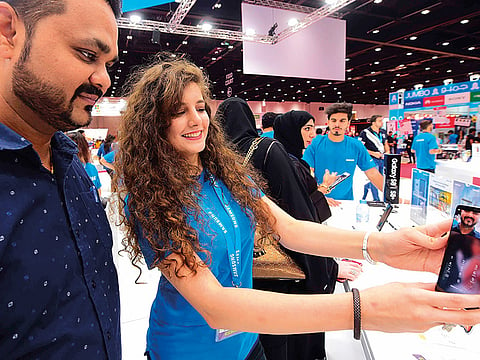Facial recognition to become universal feature on smartphones
But that does not mean fingerprint will be out of the smartphone market

Dubai: Facial recognition is a technology that is inevitable, but that does not mean that fingerprints scanners will be out of the smartphone market anytime soon, industry experts said.
Apple offers 3D facial recognition on its iPhone X while Samsung offers 2D facial recognition on its flagships phone.
Facial recognition was first introduced in Android 4.0 way back in 2011, but it was not a defining feature.
“The big problem with facial/iris scanning is the need to look directly at the handset, whereas a fingerprint reading can be authorised while the phone is en route from the pocket to in front of the face. For basic security, this extra delay will likely just frustrate consumers rather than reassure them,” said Daniel Gleeson, senior analyst for consumer technology at Ovum.
Even right now, face recognition is part of the Smart Lock feature available on most Android devices. Microsoft’s Windows Hello, introduced in 2015, can allow users to sign into their PCs with facial identification.
Nabila Popal, senior research manager at International Data Corporation, said that both the technologies will be there and it all depends on what the consumer is comfortable with.
“Everyone is comfortable with fingerprint right now and it is faster than facial recognition but how consumers adapt to facial recognition have to be seen. Facial recognition will no more be a luxury feature and it will be a standard feature on more devices. It will take time for consumers to adapt to the facial recognition,” she said.
According to Acuity Market Intelligence, biometric technology will soon be ubiquitous on smartphones and the company projects that nearly two-thirds of smartphones shipped worldwide this year will feature some sort of biometric capability.
Gleeson said that iris scanning is more secure than basic fingerprint scanning which can be fooled with just a printer and a piece of paper. However, in 2016 several companies started using 3D fingerprint reading technology which looks for the various valleys and ridges in a fingerprint to make sure it is a real finger and not a flat picture.
Annette Zimmermann, research director at Gartner, said that people don’t have much experience with facial-recognition technology.
“The facial recognition is emerging as the new option instead of fingerprint, and I see it as the rise of biometric technology. We will see more brands to come up with this technology from next year onwards.
Apart from smartphones, the fingerprint is still important, especially for wearables,” she said.
“Fingerprint is faster to open a device but I haven’t seen the facial recognition technology in Apple and how fast it works. Apple has shown that the phone doesn’t need to be in front of the face, it is enough to see the device at a 45-degree angle. It should be better than what Samsung currently offers,” she said.
Samsung is using facial recognition and iris scanning to authorise payments on its new device but Zimmermann said that mobile payments haven’t really taken off in many parts of the world.
However, she said that authorising payments will be an added feature apart from the authentication process.
Apple acquired the facial recognition artificial intelligence company Real Face and Emotient, a start-up that uses artificial-intelligence technology to read people’s emotions by analysing facial expressions last year.
“Emotion sensing is something that will understand the user better. And decrypting human emotions by analysing facial expression is a growing area among tech companies. New used cases will emerge in the next couple of years,” she said.
Gleeson said that iris scanning is much more secure than basic fingerprint scanning, but even with improvement iris scanning is still more secure.
“Iris scanning will likely find a use for sensitive corporate and government communications where double and triple factor authentication may be desired,” he said.



